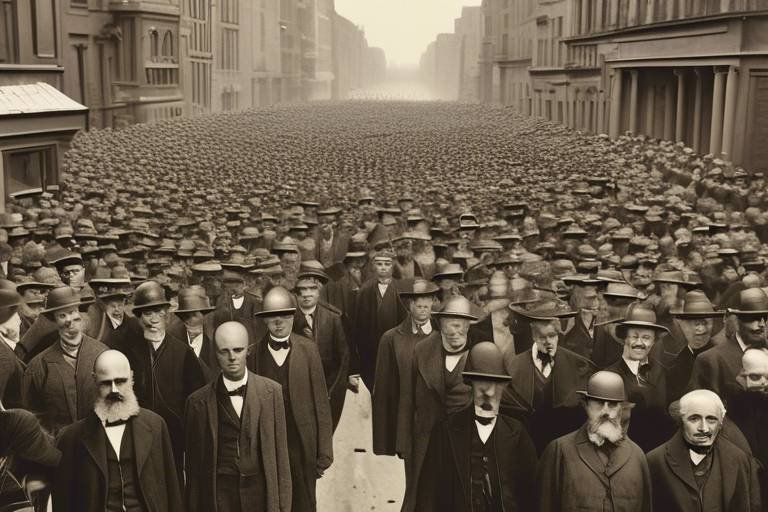Questioning the Social Contract Theory
The social contract theory has long been a cornerstone of political philosophy, shaping our understanding of governance, authority, and individual rights. But have you ever stopped to think about its underlying assumptions? Is the idea that we all tacitly agree to abide by the rules of society truly valid? This article dives deep into the complexities and criticisms surrounding the social contract theory, examining its historical roots, philosophical implications, and relevance in contemporary society. By questioning its foundations, we aim to uncover the nuances that often go unnoticed in discussions about social contracts.
At its core, the social contract theory posits that individuals consent, either explicitly or implicitly, to surrender some of their freedoms in exchange for the protection and benefits provided by a governing body. This notion sounds straightforward, but the reality is far more intricate. For instance, how do we define the terms of this 'contract'? Who gets to decide what freedoms are forfeited and which protections are guaranteed? These questions aren't just academic; they resonate deeply in today's world, where issues of consent, representation, and individual rights are more crucial than ever.
Historically, the social contract theory has been championed by several influential philosophers, each bringing their own perspectives and interpretations. Think about Hobbes, who painted a grim picture of life without authority, suggesting that humans would descend into chaos. Contrast this with Locke, who emphasized the importance of individual rights and the government's role in protecting them. Then there's Rousseau, who believed in the collective will of the people. Each of these thinkers presents a different angle, yet they all contribute to the overarching narrative of the social contract.
In today's society, the implications of these theories can be seen in various discussions, from political debates to social movements. For example, the question of whether we truly consent to the laws that govern us is at the heart of many protests against perceived injustices. When marginalized groups feel excluded from the social contract, it raises alarms about the legitimacy of our political systems. Are we all truly part of this contract, or are some voices systematically silenced?
As we explore the critiques of social contract theory, we must consider whether its assumptions about consent and representation hold up in the real world. Critics argue that the notion of a universal agreement is unrealistic, especially in diverse societies where not everyone has a seat at the table. The idea that all individuals willingly consent to the terms of governance seems almost utopian, doesn't it? Moreover, the representation issues within the framework often leave marginalized groups without a voice, further complicating the applicability of the social contract.
In conclusion, questioning the social contract theory is not just an academic exercise; it's a necessary endeavor that can lead to a deeper understanding of our political landscape. By critically examining its historical roots and contemporary relevance, we open the door to meaningful discussions about consent, representation, and the very nature of governance itself. So, the next time you hear about the social contract, ask yourself: who truly benefits from this agreement, and who gets left behind?
- What is the social contract theory? - It is a philosophical concept that suggests individuals consent to surrender some freedoms in exchange for societal protection and governance.
- Who are the key philosophers associated with social contract theory? - The primary figures include Thomas Hobbes, John Locke, and Jean-Jacques Rousseau, each offering unique perspectives on the nature of the social contract.
- What are common criticisms of social contract theory? - Critics often point out unrealistic assumptions about consent and inadequate representation of marginalized groups.
- How does social contract theory apply to modern society? - It informs discussions about governance, individual rights, and the legitimacy of political systems, especially in relation to consent and representation.

Historical Background
This article explores the complexities and criticisms surrounding the social contract theory, examining its historical roots, philosophical implications, and relevance in contemporary society.
Understanding the origins of social contract theory is essential to grasp its evolution. The concept of a social contract has been a cornerstone of political philosophy for centuries, shaping how we think about governance, authority, and individual rights. It all began in a time when societies were transitioning from feudal systems to more centralized forms of governance. Philosophers began to ponder the nature of human existence and the justification of political authority, leading to the formulation of the social contract as a theoretical model of the state.
The historical backdrop is rich and complex, with various thinkers contributing to the discourse. Notably, the Renaissance period sparked a renewed interest in humanism and individual rights, setting the stage for social contract theory. During this time, several key philosophers emerged, each offering unique insights that would lay the groundwork for modern political thought. Their ideas were not merely academic; they were responses to the tumultuous political landscapes of their times, including wars, revolutions, and the rise of nation-states.
Some of the most influential figures in this development include:
- Thomas Hobbes - Advocated for a powerful sovereign to maintain peace and order.
- John Locke - Emphasized natural rights and the importance of government protecting these rights.
- Jean-Jacques Rousseau - Focused on the collective will of the people and the idea of general will.
Each of these thinkers approached the social contract from different angles, influenced by their historical contexts. Hobbes, writing during the English Civil War, viewed human life as "solitary, poor, nasty, brutish, and short," leading him to argue for an absolute authority to avoid chaos. In contrast, Locke's ideas emerged in a time of relative stability, allowing him to advocate for a government that serves the people and protects their rights. Rousseau, meanwhile, was responding to the inequalities he observed in society, proposing a model where the collective will of the people should guide governance.
The evolution of social contract theory reflects a broader shift in philosophical thought, moving from a focus on authority and control to an emphasis on individual rights and collective responsibility. As we delve deeper into the contributions of these key philosophers, we will uncover how their ideas resonate in today's political landscape and continue to influence debates about governance, rights, and social justice.
Prominent thinkers like Hobbes, Locke, and Rousseau have shaped social contract theory. This section highlights their differing views and how these perspectives influence modern political thought.
Thomas Hobbes proposed a strong central authority to avoid chaos. This subheading examines his justification for absolute power and the implications for individual freedoms.
Hobbes viewed the state of nature as a brutal existence. This subsection discusses his characterization of human life without governance and its impact on his theories.
Hobbes argued that individuals consent to surrender freedoms for security. This part analyzes the philosophical underpinnings of his social contract justification.
John Locke presented a contrasting view, emphasizing individual rights. This section explores his ideas on government’s role in protecting these rights and the right to rebellion.
Various criticisms challenge the validity of social contract theory. This section outlines major arguments against the theory, including its assumptions about consent and representation.
Critics argue that social contract theory relies on unrealistic assumptions of consent. This subsection examines the implications of presumed consent in diverse societies.
The theory's application often fails to address representation adequately. This part discusses how marginalized groups are excluded from the social contract framework.
Q: What is social contract theory?
A: Social contract theory is a philosophical model that explains the origin of society and the legitimacy of government authority through an implicit agreement among individuals to form a society.
Q: Who are the key philosophers associated with social contract theory?
A: The most notable philosophers are Thomas Hobbes, John Locke, and Jean-Jacques Rousseau, each offering different perspectives on the nature of the social contract.
Q: Why is social contract theory relevant today?
A: It provides a framework for understanding the relationship between individuals and the state, especially in discussions about rights, governance, and social justice.

Key Philosophers
The realm of social contract theory is not just a dry academic field; it's a vibrant tapestry woven by the thoughts and ideas of several influential philosophers. These thinkers have not only shaped the course of political philosophy but have also left a lasting impact on how we perceive governance, rights, and the relationship between individuals and the state. At the heart of this theory are three titans: Thomas Hobbes, John Locke, and Jean-Jacques Rousseau. Each philosopher offers a unique lens through which we can examine the complexities of human nature and society.
Hobbes, with his grim outlook on human nature, believed that life without a strong governing authority would lead to chaos. He famously described the state of nature as "solitary, poor, nasty, brutish, and short." In contrast, Locke's perspective was more optimistic, focusing on the inherent rights of individuals and the government's role in protecting those rights. Rousseau, on the other hand, took a more radical approach, arguing that the social contract should reflect the general will of the people, emphasizing equality and collective decision-making.
To understand the nuances of their arguments, let’s break down their contributions:
| Philosopher | Key Ideas | Impact on Modern Thought |
|---|---|---|
| Thomas Hobbes | Advocated for a strong central authority to avoid chaos; viewed human nature as self-interested. | Influenced discussions on the necessity of government and the justification for absolute power. |
| John Locke | Emphasized natural rights (life, liberty, property); believed in the right to rebellion against unjust governments. | Foundation for liberal democracy and human rights; inspired revolutions and constitutional frameworks. |
| Jean-Jacques Rousseau | Introduced the concept of the general will; argued for direct democracy and social equality. | Influenced modern political ideologies, including socialism and democratic theory. |
As we delve deeper into each philosopher's ideas, we can see how their thoughts resonate in today's political landscape. For instance, Hobbes' fear of anarchy might still echo in discussions about national security, while Locke's advocacy for individual rights continues to be a cornerstone of contemporary human rights debates. Rousseau's emphasis on community and collective decision-making can be seen in modern democratic practices, where the voice of the majority is paramount.
In essence, the contributions of these key philosophers not only laid the groundwork for social contract theory but also continue to influence how we think about power, authority, and individual rights in our societies today. Their diverse perspectives remind us that the social contract is not merely a historical concept; it is a living dialogue that invites us to question and redefine our understanding of governance and community.

Hobbes’ Perspective
Thomas Hobbes, a towering figure in the realm of political philosophy, presented a rather grim view of human nature and society. He famously described life in the state of nature as "solitary, poor, nasty, brutish, and short." This stark characterization is pivotal in understanding Hobbes’ rationale for a strong, centralized authority. He believed that without a governing body, individuals would be in a constant state of conflict, driven by their self-interest and desires. The chaotic existence he envisioned was not just a theoretical exercise; it was a profound warning about the dangers of anarchy.
Hobbes argued that to escape this dreadful state, individuals would willingly enter into a social contract, surrendering some of their freedoms to a sovereign power in exchange for security and order. This notion of a social contract is not merely about governance; it's about survival. The sovereign, whether a monarch or an assembly, is granted absolute authority to maintain peace and prevent the descent into chaos. But what does this mean for individual freedoms? Does surrendering rights to a powerful ruler imply a loss of humanity? Hobbes would argue that it is a necessary sacrifice for the greater good.
To unpack Hobbes’ justification for absolute power, it’s crucial to understand his views on human nature. He posited that humans are inherently selfish and competitive, leading to inevitable conflicts. Thus, the social contract serves as a mechanism to transcend these primal instincts. In Hobbes’ world, the sovereign is the embodiment of collective will, tasked with the protection of its citizens. However, this raises an important question: Can absolute power ever be justified? In a society where dissent is stifled, how do we ensure that the sovereign acts in the best interest of the people?
Hobbes' perspective invites us to ponder the delicate balance between authority and freedom. While a strong central authority may provide stability, it can also lead to tyranny if unchecked. His ideas challenge us to consider the implications of power dynamics in our own society. As we reflect on Hobbes' theories, we might ask ourselves: Are we willing to trade some of our freedoms for the promise of security? And if so, at what cost?
In conclusion, Hobbes’ perspective on the social contract is a compelling exploration of human nature and governance. His assertion that individuals must relinquish certain freedoms for the sake of security continues to resonate in contemporary discussions about authority and individual rights. The implications of his philosophy are profound, prompting us to critically evaluate the structures of power that govern our lives today.
- What is the main idea behind Hobbes' social contract theory? Hobbes believed that individuals consent to give up some freedoms to a powerful authority in exchange for security and order.
- How does Hobbes view human nature? Hobbes viewed human nature as inherently selfish and competitive, leading to conflict without governance.
- What are the implications of Hobbes' perspective for individual freedoms? While Hobbes advocates for a strong authority to maintain peace, this can lead to the potential loss of individual freedoms if power is not checked.
- Can Hobbes' ideas be applied to modern society? Yes, Hobbes' theories prompt ongoing discussions about the balance between authority and individual rights in contemporary governance.

State of Nature
Thomas Hobbes painted a rather bleak picture of the "state of nature," a concept that serves as a foundational element in his social contract theory. To Hobbes, this state was not a tranquil paradise but rather a chaotic and violent realm where life was "solitary, poor, nasty, brutish, and short." Can you imagine living in a world where every day felt like a battle for survival? In Hobbes' view, without the structure of a governing body, humans would be in a constant state of conflict, driven by their basic instincts and desires.
In this grim scenario, Hobbes believed that individuals would act solely out of self-interest, leading to a breakdown of social order. He argued that without a strong authority to enforce rules and maintain peace, people would resort to violence and deceit. It’s like a wild animal kingdom where the strongest rule and the weak are left to fend for themselves. Hobbes argued that this inherent nature of humanity justified the need for a powerful sovereign to impose order and security.
To better understand Hobbes' concept of the state of nature, consider the following key characteristics:
- Survival Instincts: In the absence of societal rules, individuals prioritize their own survival over communal well-being.
- Fear and Distrust: With no governing authority, people would live in constant fear of betrayal and violence from others.
- Conflict and Competition: The struggle for resources would lead to inevitable conflicts, as everyone vies for the same limited goods.
Hobbes argued that this chaotic existence would be untenable, prompting individuals to seek a way out. This is where the social contract comes into play. By agreeing to form a society and submit to a common authority, individuals relinquish certain freedoms in exchange for the protection and stability that a governing body provides. It’s a trade-off, much like giving up a bit of your freedom to ensure your safety in a crowded city. The irony, however, is that in seeking security, individuals might end up forfeiting their autonomy, leading to a paradox of freedom versus security.
In summary, Hobbes’ state of nature serves as a crucial backdrop for understanding his advocacy for a strong central authority. It raises significant questions about human nature and the necessity of governance. Are we inherently selfish beings destined for conflict, or can we rise above our primal instincts? The answers to these questions not only shape Hobbes’ philosophy but also continue to influence contemporary discussions about the role of government and the balance between freedom and security.
- What is the state of nature according to Hobbes? Hobbes describes it as a chaotic environment where individuals act solely out of self-interest, leading to conflict and insecurity.
- Why does Hobbes believe a strong authority is necessary? He argues that without a governing body, humans would revert to violence and chaos, making life unbearable.
- How does the social contract relate to the state of nature? The social contract is an agreement to form a society and submit to authority in exchange for protection and order.
- What are the implications of Hobbes' views on modern society? His ideas provoke discussions about the balance between individual freedoms and the need for security in contemporary governance.

Social Contract Justification
Thomas Hobbes’ vision of the social contract is a fascinating blend of necessity and pragmatism. He argued that in order to escape the chaos of the state of nature, individuals must consent to surrender certain freedoms to a powerful, centralized authority. This idea might sound counterintuitive at first—why would anyone willingly give up their freedoms? Well, Hobbes believed that the alternative was far worse: a life that was "solitary, poor, nasty, brutish, and short." In this light, the social contract becomes a rational choice for individuals seeking safety and order in a tumultuous world.
Hobbes’ justification for this social contract is built on a few key principles:
- Security over Freedom: The primary goal of the social contract is to ensure the safety of individuals. By relinquishing some freedoms, people gain the protection of a sovereign authority that can enforce laws and maintain order.
- Collective Agreement: Hobbes posits that individuals implicitly agree to this contract when they choose to live within a society. This agreement is not always verbalized but is understood as a social norm.
- Fear of Anarchy: The dread of returning to a state of nature, where life is chaotic and dangerous, drives individuals to accept the social contract. The fear of the unknown often outweighs the discomfort of giving up certain liberties.
Now, let’s look deeper into the implications of Hobbes’ social contract justification. For one, it raises profound questions about the nature of authority and individual rights. If we consent to surrender our freedoms, to what extent can the sovereign exercise power? Hobbes believed that the sovereign's authority should be absolute to maintain peace and prevent civil war. However, this opens the door to potential tyranny, as the balance between security and freedom can easily tip too far in favor of control.
Moreover, Hobbes’ justification implies a certain level of homogeneity in society. The idea that everyone has agreed to the same terms overlooks the complexities of diverse populations. In reality, not everyone may feel represented in this social contract, leading to feelings of disenfranchisement among marginalized groups. This brings us to a critical examination of how social contract theory plays out in modern contexts, where the voices of all community members must be considered to create a truly just and equitable society.
In conclusion, while Hobbes’ social contract justification provides a compelling argument for the necessity of a strong governing authority, it also raises important questions about the nature of consent, representation, and individual rights. As we continue to explore these themes, it becomes increasingly clear that the social contract is not just a historical concept but a living framework that shapes our understanding of governance and society today.
- What is the social contract theory? The social contract theory is a philosophical concept that suggests individuals consent, either explicitly or implicitly, to surrender some of their freedoms to a governing body in exchange for protection and social order.
- Who are the main philosophers associated with social contract theory? The main philosophers include Thomas Hobbes, John Locke, and Jean-Jacques Rousseau, each offering unique perspectives on the nature of the social contract and its implications for society.
- What are the criticisms of social contract theory? Critics argue that social contract theory relies on unrealistic assumptions about consent and often fails to adequately represent marginalized groups within society.

Locke’s Perspective
John Locke's view on social contract theory presents a refreshing contrast to that of Thomas Hobbes. While Hobbes painted a rather bleak picture of human nature, Locke adopted a more optimistic stance. He believed that individuals are inherently reasonable and capable of self-governance. In Locke's perspective, the social contract is not about surrendering freedoms to an absolute authority; rather, it is about establishing a government that exists to protect the natural rights of its citizens. These rights, according to Locke, include life, liberty, and property, which he considered fundamental to human existence.
Locke argued that the legitimacy of government is derived from the consent of the governed. This idea was revolutionary at the time and laid the groundwork for modern democratic thought. He posited that individuals enter into a social contract to form a government that will safeguard their rights, and in return, they agree to abide by the laws established by that government. However, Locke was adamant that this consent must be explicit; if the government fails to protect the rights of its citizens, they have the right to revolt. This notion of the right to rebellion is a cornerstone of Locke's philosophy and has had lasting implications for political theory.
Locke's theory also emphasizes the importance of limited government. He believed that a government's power should be constrained by law and that it should operate with the consent of the people. This principle of limited government ensures that individual freedoms are not infringed upon. Locke's ideas were not just theoretical; they influenced significant political documents, such as the United States Declaration of Independence and the French Declaration of the Rights of Man and of the Citizen.
To further illustrate Locke's perspective, consider the following table that compares key aspects of Hobbes' and Locke's theories:
| Aspect | Hobbes | Locke |
|---|---|---|
| View of Human Nature | Pessimistic, self-interested | Optimistic, rational |
| State of Nature | Brutal and chaotic | Peaceful and cooperative |
| Social Contract Purpose | To create a strong authority | To protect natural rights |
| Right to Revolt | None | Yes, if rights are violated |
Locke's emphasis on individual rights and limited government resonates deeply in contemporary society. His thoughts challenge us to consider the balance between authority and freedom. If we look around today, we can see echoes of Locke's ideas in various democratic movements, where people demand accountability from their leaders and fight for their rights. His legacy encourages us to question the nature of our governments and to advocate for a system that truly reflects the will of the people.

Critiques of Social Contract Theory
The social contract theory has been a cornerstone of political philosophy, but it is not without its detractors. Critics argue that the theory is built on shaky foundations, primarily due to its assumptions about consent and representation. At its core, the theory suggests that individuals willingly enter into a contract to form a society, but this notion of consent is often questioned. How can we truly say that consent is given when many individuals are born into systems that they did not choose? This raises fundamental questions about the legitimacy of authority and governance.
One of the primary critiques revolves around the assumptions of consent. Critics argue that the idea of a social contract presupposes that all individuals have equal opportunities to voice their opinions and agree to the terms set forth by society. In reality, many people find themselves in situations where they have no real choice. For instance, consider marginalized communities who may not have a say in the laws and regulations that govern them. Their existence within the social contract is often overlooked, leading to a skewed representation of consent. This situation can lead to a feeling of disenfranchisement, where individuals feel that their voices are not heard or valued.
Moreover, the concept of consent is often portrayed as a binary choice: to agree or to dissent. However, in complex societies, the reality is much more nuanced. The social contract theory tends to ignore the myriad of factors that influence an individual's ability to consent, such as socioeconomic status, education, and cultural background. For instance, individuals living in poverty may feel compelled to accept the status quo, even if it is not in their best interest. This raises an important question: can we truly consider their acceptance as genuine consent?
Another significant critique pertains to the representation issues inherent in social contract theory. In many cases, the theory does not adequately address the voices of those who are marginalized. The traditional social contract is often viewed through a Eurocentric lens, which fails to account for the diverse experiences and perspectives that exist globally. This oversight can lead to policies and laws that do not reflect the needs or desires of all members of society. For example, discussions about governance often center around the rights of property owners while neglecting the rights of those who do not own property. This imbalance raises ethical concerns about whose interests are truly being represented.
To illustrate these critiques, consider the following table that summarizes the key arguments against social contract theory:
| Critique | Description |
|---|---|
| Assumptions of Consent | Many individuals do not have the opportunity to genuinely consent due to systemic inequalities. |
| Representation Issues | Marginalized groups are often excluded from the social contract framework, leading to unrepresented interests. |
| Binary Choice | The theory oversimplifies consent as a binary choice, ignoring the complexities of individual circumstances. |
In summary, while social contract theory offers a compelling framework for understanding the relationship between individuals and society, it is crucial to critically examine its limitations. By recognizing the assumptions of consent and the issues of representation, we can engage in more inclusive discussions about governance and authority. This way, we can work towards a social contract that truly reflects the will and needs of all individuals, not just a select few.
- What is social contract theory? Social contract theory is a political philosophy that explores the legitimacy of authority and governance based on the idea that individuals consent to form societies and governments.
- Who are the key philosophers associated with social contract theory? The main philosophers include Thomas Hobbes, John Locke, and Jean-Jacques Rousseau, each of whom presented different perspectives on the nature of the social contract.
- What are the main critiques of social contract theory? The primary critiques focus on unrealistic assumptions of consent, inadequate representation of marginalized groups, and the oversimplification of consent as a binary choice.
- How does social contract theory apply to modern society? While social contract theory provides a framework for understanding governance, its critiques highlight the need for more inclusive and equitable political systems that address the needs of all citizens.

Assumptions of Consent
The social contract theory is often built on the premise that individuals willingly consent to form a society and abide by its rules. However, this assumption of consent is where the theory faces significant scrutiny. Critics argue that consent is frequently presumed rather than explicitly given, raising questions about its legitimacy in diverse populations. Imagine a group of people being asked to sign a contract without fully understanding its terms; would that truly constitute consent? In many cases, social contract theorists overlook the complexities of modern societies, where individuals may not have an equal voice or the ability to opt out of the social contract altogether.
One major critique revolves around the idea of implicit consent. Many theorists, including Hobbes and Locke, suggest that by simply residing within a society, individuals implicitly agree to its rules and regulations. But does living in a society really equate to consenting to its governance? This notion raises eyebrows, especially when considering marginalized communities who may have little to no say in the political processes that govern their lives. For instance, how can we claim that everyone living in a country has consented to the government's authority when systemic barriers often prevent certain groups from participating in the political dialogue?
Furthermore, the assumption of consent tends to ignore historical injustices that have shaped societal structures. For example, many modern nation-states were formed through colonialism and conquest, where the voices of indigenous populations were silenced. If the social contract is meant to reflect the collective agreement of its members, how does it account for those who were never given a seat at the table? This discrepancy is crucial to understanding the limitations of the social contract theory in representing a truly democratic society.
Additionally, the concept of consent becomes even murkier when we consider the role of coercion. In situations where individuals feel compelled to accept certain conditions—be it due to economic necessity or social pressure—can we genuinely say that their consent is informed and voluntary? The line between consent and coercion can be incredibly thin, leading to a situation where individuals may comply with societal rules not out of agreement but rather out of fear of repercussions.
In light of these critiques, it's essential to rethink the foundations of social contract theory. Perhaps a more nuanced understanding of consent is needed—one that acknowledges the diverse experiences and voices within society. This could involve incorporating mechanisms for genuine participation and representation, ensuring that all members of society have a say in the agreements that govern them. Only then can we begin to address the complexities of consent in a way that is truly reflective of the society we live in.
- What is social contract theory? Social contract theory is a political philosophy that explores the legitimacy of authority and the origins of government based on an implicit agreement among individuals to form a society.
- Who are the key philosophers associated with social contract theory? The most notable philosophers include Thomas Hobbes, John Locke, and Jean-Jacques Rousseau, each offering distinct perspectives on the nature of the social contract.
- What are the main critiques of social contract theory? Critics argue that the theory relies on unrealistic assumptions about consent, often overlooks marginalized voices, and fails to adequately address issues of representation and coercion.
- How does the assumption of consent impact societal governance? If consent is merely presumed, it raises questions about the legitimacy of authority and the extent to which individuals truly agree to the rules governing their lives.

Representation Issues
When we dive deep into the social contract theory, one glaring issue stands out: the representation of marginalized groups. It’s like trying to fit a square peg into a round hole—no matter how hard you try, it just doesn’t work. The theory, as proposed by prominent thinkers, often assumes a homogenous society where everyone’s voice is equally valued. However, in reality, we live in a world bursting with diversity, where different cultures, backgrounds, and experiences shape our social fabric.
The social contract theory paints a picture of a collective agreement among individuals to form a society. But who gets to sign this contract? Are the voices of the poor, the racial minorities, or the gender non-conforming individuals truly heard? Often, the answer is a resounding no. This exclusion raises significant questions about the legitimacy of any social contract that fails to represent all its constituents. It’s akin to a party where only a select few are invited, while the majority are left outside, peering in through the windows.
Furthermore, the concept of consent in social contract theory is often oversimplified. Critics argue that it relies on an unrealistic assumption that everyone has the same opportunity to give their consent. In many cases, marginalized groups are either unaware of the social contract or feel pressured to accept terms that do not serve their interests. This lack of genuine consent leads to a skewed representation where the dominant voices drown out the whispers of the less fortunate.
To illustrate this point, let’s consider a few examples of how representation issues manifest in society:
- Political Representation: Many political systems are dominated by a few elite groups, leaving little room for diverse perspectives. This can lead to policies that favor the wealthy while neglecting the needs of the underprivileged.
- Economic Disparities: The social contract often overlooks economic imbalances, where the rich get richer and the poor remain trapped in a cycle of poverty. This discrepancy is a stark reminder that not everyone benefits equally from the social contract.
- Social Movements: Grassroots movements often emerge as a response to the failures of the social contract. These movements seek to amplify the voices of those who have been historically marginalized and demand a seat at the table.
In conclusion, the representation issues within social contract theory highlight a fundamental flaw in its application. If we truly want a society that reflects the values of all its members, we must strive for an inclusive approach that acknowledges and addresses the voices that have been silenced for far too long. Only then can we begin to construct a social contract that is not just theoretical but genuinely representative of the rich tapestry of human experience.
Q: What is social contract theory?
A: Social contract theory is a philosophical concept that suggests individuals consent, either explicitly or implicitly, to form a society and abide by its rules in exchange for protection and social order.
Q: Who are the key philosophers associated with social contract theory?
A: The key philosophers include Thomas Hobbes, John Locke, and Jean-Jacques Rousseau, each offering unique perspectives on the nature of the social contract and the role of government.
Q: What are some criticisms of social contract theory?
A: Major criticisms include its assumptions about consent, representation issues, and the exclusion of marginalized groups from the social contract framework.
Q: How does representation affect the social contract?
A: Representation issues can undermine the legitimacy of the social contract, as it often fails to include diverse voices, leading to policies that do not reflect the needs of all individuals in society.
Frequently Asked Questions
- What is social contract theory?
Social contract theory is a philosophical concept that explores the legitimacy of authority and the origins of society. It suggests that individuals consent, either explicitly or implicitly, to form a society and accept certain rules in exchange for protection and social order.
- Who are the key philosophers associated with social contract theory?
The most prominent philosophers include Thomas Hobbes, John Locke, and Jean-Jacques Rousseau. Each of these thinkers offered unique perspectives on the social contract, influencing political thought and theories of governance.
- What was Hobbes' view of the state of nature?
Hobbes viewed the state of nature as a chaotic and violent environment where life was "solitary, poor, nasty, brutish, and short." He believed that without a strong central authority, individuals would act out of self-interest, leading to conflict and instability.
- How did Locke's perspective differ from Hobbes'?
Unlike Hobbes, Locke had a more optimistic view of human nature. He believed that individuals possess natural rights to life, liberty, and property, and that the government's primary role is to protect these rights. Locke also argued that people have the right to revolt against a government that fails to uphold these rights.
- What are some common critiques of social contract theory?
Critics argue that social contract theory is based on unrealistic assumptions about consent, suggesting that not all individuals genuinely agree to the terms of the contract. Additionally, there are concerns about representation, as marginalized groups often find themselves excluded from the social contract framework.
- Why is consent important in social contract theory?
Consent is fundamental to social contract theory as it legitimizes the authority of the government. It implies that individuals willingly accept the rules and regulations of society in exchange for security and order, creating a moral foundation for political authority.
- How does social contract theory apply to modern society?
In contemporary society, social contract theory continues to influence discussions about governance, rights, and responsibilities. It raises questions about the extent of governmental power and the importance of individual rights, especially in diverse and democratic societies.



















